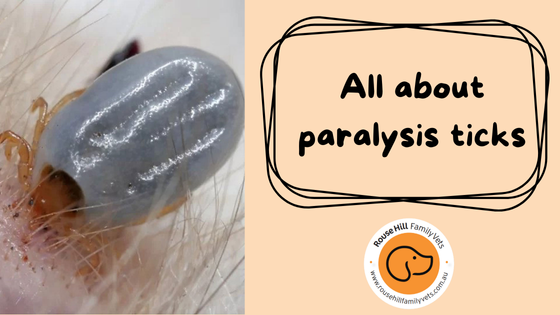Paralysis ticks are a common threat in many parts of Australia, particularly in bushland and coastal areas. These parasites attach themselves to your pet, feeding on their blood while simultaneously injecting a potent neurotoxin. Left untreated, this toxin can cause muscle weakness, paralysis, and even death in dogs and cats. While paralysis ticks are most active during the warmer months, they can pose a risk year-round.
Signs that your pet may be affected include weakness in the hind legs, difficulty breathing, vomiting, and changes in their bark or meow. Early detection and treatment are critical, and the outcome is much better when the problem is caught early.
So why are paralysis ticks such a problem? It’s because they can be difficult to detect until your pet is already showing severe symptoms. These tiny pests often hide in thick fur or hard-to-reach areas like the ears, underbelly, or between toes. Once attached, they can go unnoticed for days, quietly causing damage. The toxin they release affects the nervous system, leading to symptoms that can quickly escalate to paralysis.
If left untreated, the consequences are dire. Pets may lose the ability to walk, swallow, or breathe. In severe cases, even with immediate treatment, full recovery may not always be guaranteed, and your pet may suffer long-term effects.
But here’s the good news: paralysis ticks don’t have to be a death sentence. With proactive prevention and early detection, you can significantly reduce the risk of your pet suffering from tick paralysis. Regularly checking your pet for ticks, especially after walks in high-risk areas such as bushland or the beach, is a simple yet effective first step. Using year-round tick prevention treatments such as chews, spot-on treatments or a yearly flea and tick injection is the most effective treatment. Additionally, veterinary clinics are well-equipped to identify and remove ticks safely.
Should your pet show any signs of tick paralysis, immediate veterinary attention can save their life. With advancements in veterinary medicine, many pets recover fully when treated promptly. Anti-tick serum, combined with supportive care such as oxygen therapy and intravenous fluids, can reverse the effects of the toxin. In some cases, treatment can be effective and pets can return to normal within a few days of treatment.
Some pet owners believe that ticks are only a problem in the warmer months, or that indoor pets are not at risk. However, paralysis ticks can be a year-round threat, and even pets that spend most of their time indoors can be exposed. All it takes is a single tick carried inside on clothing or another animal. That’s why year-round prevention and vigilance are key.
At Rouse Hill Family Vets, our team is highly trained in detecting and safely removing ticks from your pet. We strongly advise against attempting to remove the tick yourself, as improper removal can cause further complications. Instead, we recommend bringing your pet to us or your nearest veterinarian immediately for safe and effective treatment.
We also offer a variety of tick prevention options to ensure your pet stays protected. Whether it’s spot-on treatments, oral chews, or annual flea and tick injections, we can recommend the best solution tailored to your pet’s unique lifestyle and needs.

